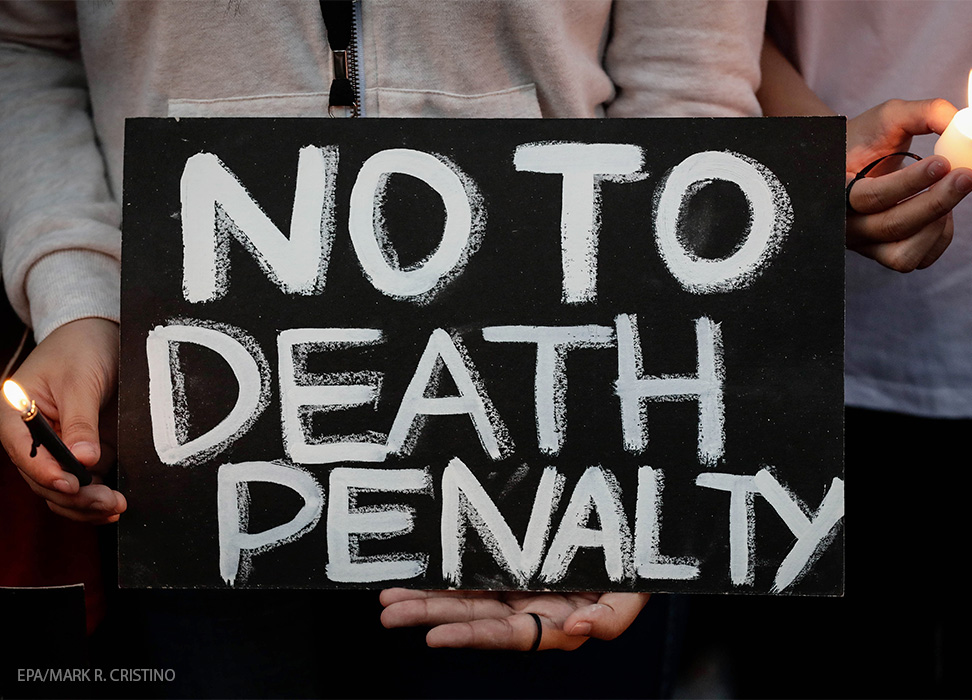
“For many years, the United Nations has opposed the death penalty in all circumstances,” said UN Human Rights Chief Volker Türk. “I share this position with the firmest conviction. Ultimately, this is about the UN Charter’s promise of the highest standards of protection of all human beings.”
Türk participated in a panel discussion on the question of the death penalty during the 52nd session of the Human Rights Council in Geneva, Switzerland.
According to Türk, evidence strongly suggests that the death penalty has little or no impact on deterring or reducing crime. A number of studies have demonstrated that countries that have abolished the death penalty have seen their murder rates unchanged or even decline, he added.
Türk added that the death penalty also discriminates against racial, ethnic, linguistic, and religious minorities, and the LGBTIQ+ community.
“The existence of the death penalty in countries that maintain it — as well as the threat of its use — can be turned to improper purposes, such as instilling fear, repressing opposition, and quashing the legitimate exercise of freedoms,” he said.
“
In short, the death penalty is, in our common experience, an atavistic relic from the past that should be shed in the 21st century.
“
VOLKER TÜRK, HIGH COMMISSIONER FOR HUMAN RIGHTS
The African region is working hard to shed this relic, according to Idrissa Sow, Chairperson of the Working Group on Death Penalty, Extrajudicial, Summary or Arbitrary Killings and Enforced Disappearances in Africa of the African Commission on Human and Peoples’ Rights. In a major development, Central African Republic, Equatorial Guinea, and Zambia recently abolished the death penalty for all offences.
According to Sow, there is an abolitionist trend on the continent, with 26 countries choosing to completely abolish the death penalty.
“[The African Commission on Human and Peoples" Rights, through its Working Group on the Death Penalty] constantly urges remaining States to limit the application of the death penalty only to the most serious crimes and to consider establishing a moratorium on executions pending consideration of abolishing the death penalty,” Sow said.
Other countries such as Malaysia are also working to abolish mandatory death penalty sentences. It is a difficult task, since most Malaysians support the death penalty because it is seen as a deterrent to crimes, according to Azalina Othman Said, Minister of Law and Institutional Reform of Malaysia. Eleven offences currently carry the mandatory death penalty in Malaysia such as murder, terrorism, and waging war on the country.
According to Said, Malaysia currently believes that the abolition of the mandatory death penalty is a balance between what is right and wrong.
José Manuel Santos Pais, Member of the Human Rights Committee, said that the death penalty, if it must be imposed, should only be used for the most serious crimes. Crimes that are not of extreme gravity involving an intentional killing should be excluded, such as corruption and drug offenses.
“States parties [to the International Covenant on Civil and Political Rights] are to review their criminal laws, revoke death sentences issued for crimes not qualifying as the most serious crimes and pursue the necessary legal procedures to resentence those convicted for such crimes,” he said.
Some questioned whether the death penalty should even be used for the most serious crimes. Mai Sato, Associate Professor at the Faculty of Law at Monash University, Director of Eleos Justice, and Deputy Director of Crime Info, grew up in a country where the death penalty is used for serious crimes such as murder and seen as an important avenue for victims’ families to seek justice. While she was growing up, she never doubted the existence or necessity of the death penalty.
“But having spent the last two decades in countries without the death penalty, my sensibilities about what constitutes justice have changed, as well as my understanding of the social and political functions that the death penalty serves,” she said.
“
I now take the view — together with more than half of the countries in the world—that the death penalty is unnecessary for all crimes, including intentional killing.
“
MAI SATO, ASSOCIATE PROFESSOR AT THE FACULTY OF LAW AT MONASH UNIVERSITY, AUSTRALIA
Sarah Belal, Executive Director of Justice Project Pakistan, stressed the importance of countries working together to abolish the death penalty.
“Since 2020, there has been a 15 percent decrease in the number of Pakistanis imprisoned abroad, brought about through strategic litigation, prisoner transfer agreements, and increased diplomatic efforts to provide relief to Pakistanis abroad,” she said. “These results are a testament to what is achievable through strategic international and domestic engagement that encourages Member States to comply with the most serious crimes standard, and the importance of appreciating the incremental steps they take in this journey toward compliance and on the path to abolition.”
There is movement in Pakistan toward abolition, including the landmark vote by the General Assembly where 125 countries voted in favour of a resolution calling for a global moratorium on the use of the death penalty with a view toward ultimately ending it for good.
Türk stated that various countries are taking steps in the right direction and reiterated that until every nation abolishes the death penalty, the road to defending human dignity will never be fully complete.
“If we maintain this momentum to eradicate this inhumane punishment once and for all, we can weave a thread of dignity back into the fabric of our societies,” Türk said.












